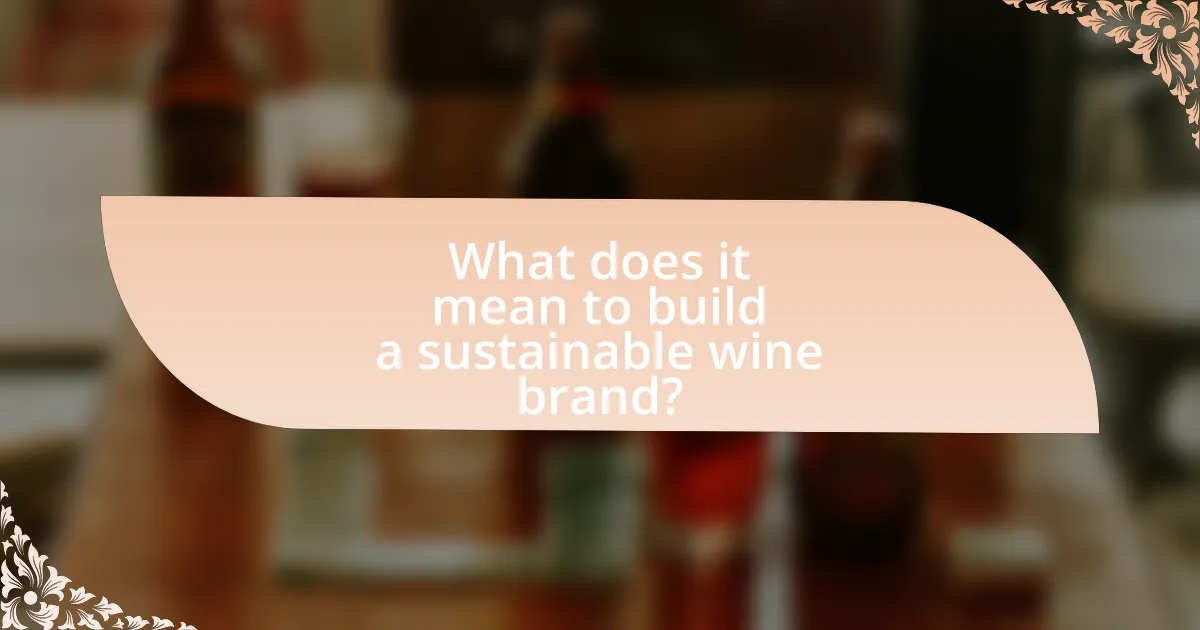Building a sustainable wine brand involves creating a wine business that emphasizes environmental stewardship, social responsibility, and economic viability. The article outlines the importance of sustainability in the wine industry, highlighting practices such as organic farming, water conservation, and fair labor conditions that can enhance grape quality and reduce environmental impact. It discusses the environmental challenges of traditional wine production and the benefits of adopting sustainable practices, including improved brand reputation, cost savings, and increased consumer demand for eco-friendly products. Additionally, the article explores effective strategies for implementing sustainability in winery operations, the role of technology, and the significance of certifications in marketing sustainable wines.

What does it mean to build a sustainable wine brand?
Building a sustainable wine brand means creating a wine business that prioritizes environmental stewardship, social responsibility, and economic viability. This involves implementing practices such as organic farming, reducing carbon emissions, conserving water, and ensuring fair labor conditions. For instance, according to the 2021 Sustainable Winegrowing Report by the California Sustainable Winegrowing Alliance, wineries that adopt sustainable practices can reduce their water usage by up to 30% and improve soil health, which enhances grape quality. Thus, a sustainable wine brand not only focuses on producing quality wine but also commits to practices that benefit the planet and society.
Why is sustainability important in the wine industry?
Sustainability is important in the wine industry because it ensures the long-term viability of vineyards and wine production while minimizing environmental impact. Sustainable practices, such as organic farming and water conservation, help preserve biodiversity and reduce carbon footprints. For instance, a study by the California Sustainable Winegrowing Alliance found that sustainable practices can lead to a 20% reduction in water usage and a 30% decrease in pesticide application. These practices not only protect natural resources but also enhance the quality of wine, as healthier ecosystems contribute to better grape growth.
What are the environmental impacts of traditional wine production?
Traditional wine production has significant environmental impacts, including soil degradation, water consumption, and pesticide use. The cultivation of vineyards often leads to soil erosion and loss of biodiversity due to monoculture practices. Additionally, traditional wine production typically requires substantial water resources; for instance, it can take approximately 600 liters of water to produce just one liter of wine. Furthermore, the application of synthetic pesticides and fertilizers can contaminate local ecosystems and harm wildlife. These factors collectively contribute to the environmental footprint of traditional wine production, highlighting the need for more sustainable practices in the industry.
How does sustainability enhance brand reputation?
Sustainability enhances brand reputation by fostering consumer trust and loyalty. Brands that adopt sustainable practices demonstrate a commitment to environmental and social responsibility, which resonates with increasingly eco-conscious consumers. Research indicates that 66% of global consumers are willing to pay more for sustainable brands, highlighting the financial benefits of a strong sustainable reputation. Furthermore, companies recognized for their sustainability efforts often experience positive media coverage and enhanced public perception, further solidifying their brand image in competitive markets.
What are the key principles of a sustainable wine brand?
The key principles of a sustainable wine brand include environmental stewardship, social responsibility, and economic viability. Environmental stewardship involves practices such as organic farming, water conservation, and biodiversity preservation, which help minimize the ecological footprint of wine production. Social responsibility focuses on fair labor practices, community engagement, and promoting health and wellness among consumers. Economic viability ensures that the brand remains profitable while investing in sustainable practices, thereby supporting long-term growth and stability. These principles are supported by industry standards such as the International Organization for Standardization (ISO) and certifications like Organic and Biodynamic, which validate the commitment to sustainability in wine production.
How can organic farming practices be integrated into wine production?
Organic farming practices can be integrated into wine production by adopting methods such as using organic fertilizers, implementing crop rotation, and employing natural pest control techniques. These practices enhance soil health and biodiversity, which are crucial for sustainable viticulture. For instance, organic fertilizers like compost improve soil structure and nutrient availability, while crop rotation helps prevent disease and pest buildup. Additionally, natural pest control methods, such as introducing beneficial insects, reduce reliance on synthetic pesticides. According to the USDA, organic vineyards can yield grapes of comparable quality to conventional ones while promoting environmental sustainability.
What role does water conservation play in sustainable winemaking?
Water conservation is crucial in sustainable winemaking as it reduces resource depletion and enhances vineyard resilience. Efficient water management practices, such as drip irrigation and rainwater harvesting, minimize water usage while maintaining grape quality. According to the California Department of Water Resources, vineyards that implement water-saving techniques can reduce water consumption by up to 30%. This not only supports environmental sustainability but also improves the economic viability of wineries by lowering operational costs associated with water use.

What strategies can be employed to build a sustainable wine brand?
To build a sustainable wine brand, wineries should implement strategies such as adopting organic farming practices, utilizing renewable energy sources, and engaging in community outreach. Organic farming practices reduce chemical inputs, which can enhance soil health and biodiversity, leading to better grape quality and environmental sustainability. For instance, according to the Organic Trade Association, organic wine sales in the U.S. grew by 20% in 2020, indicating a rising consumer preference for sustainably produced products. Utilizing renewable energy sources, such as solar panels, can significantly lower carbon footprints and operational costs. Additionally, engaging in community outreach fosters local partnerships and enhances brand reputation, as seen in successful wineries that actively participate in local environmental initiatives. These strategies collectively contribute to a sustainable wine brand that appeals to environmentally conscious consumers.
How can wineries implement sustainable practices in their operations?
Wineries can implement sustainable practices by adopting organic farming methods, utilizing renewable energy sources, and optimizing water usage. Organic farming reduces chemical inputs, promoting biodiversity and soil health, which is essential for sustainable viticulture. For instance, according to the Organic Trade Association, organic vineyards can enhance ecosystem services and reduce pollution. Utilizing renewable energy, such as solar panels, can significantly decrease carbon footprints; a study by the California Sustainable Winegrowing Alliance found that wineries using solar energy reduced greenhouse gas emissions by up to 50%. Additionally, optimizing water usage through drip irrigation and rainwater harvesting can conserve water resources, which is critical in regions facing drought. These practices collectively contribute to a more sustainable operation, aligning with consumer demand for environmentally responsible products.
What technologies can support sustainable wine production?
Technologies that can support sustainable wine production include precision viticulture, renewable energy systems, and water management technologies. Precision viticulture utilizes data analytics and sensors to optimize vineyard management, leading to reduced chemical use and improved resource efficiency. Renewable energy systems, such as solar panels and wind turbines, help wineries reduce their carbon footprint by generating clean energy for operations. Water management technologies, including drip irrigation and rainwater harvesting systems, enhance water conservation and ensure efficient use of this vital resource in wine production. These technologies collectively contribute to environmentally friendly practices and enhance the sustainability of wine brands.
How can supply chain management contribute to sustainability?
Supply chain management can contribute to sustainability by optimizing resource use, reducing waste, and enhancing transparency throughout the supply chain. Efficient supply chain practices, such as sourcing materials locally and implementing just-in-time inventory systems, minimize transportation emissions and lower carbon footprints. For example, a study by the World Economic Forum found that improving supply chain efficiency can reduce greenhouse gas emissions by up to 30%. Additionally, sustainable supply chain management encourages the use of eco-friendly materials and practices, which can lead to a more responsible production process and promote ethical sourcing. This holistic approach not only benefits the environment but also enhances brand reputation and consumer trust in the wine industry.
What marketing strategies are effective for promoting a sustainable wine brand?
Effective marketing strategies for promoting a sustainable wine brand include leveraging storytelling, utilizing social media, and engaging in partnerships with eco-conscious organizations. Storytelling allows brands to communicate their sustainability practices and values, creating an emotional connection with consumers. For instance, brands can share the journey of their grapes from vineyard to bottle, highlighting organic farming methods or water conservation efforts. Social media platforms enable brands to reach a wider audience, showcasing their sustainable practices through visually appealing content and engaging campaigns. Collaborating with eco-conscious organizations can enhance credibility and visibility, as partnerships often lead to co-marketing opportunities and access to like-minded consumers. According to a study by Nielsen, 66% of global consumers are willing to pay more for sustainable brands, underscoring the effectiveness of these strategies in attracting a dedicated customer base.
How can storytelling enhance consumer connection to sustainability?
Storytelling enhances consumer connection to sustainability by creating emotional engagement and relatability. When brands share narratives about their sustainable practices, such as sourcing grapes from organic vineyards or reducing carbon footprints, consumers can visualize the impact of their choices. Research indicates that 70% of consumers prefer brands that tell a story, as it fosters trust and loyalty. For example, a wine brand that narrates its journey towards sustainability can evoke a sense of community and shared values, making consumers feel part of a larger movement. This emotional connection drives purchasing decisions, as consumers are more likely to support brands that align with their values on sustainability.
What role do certifications play in marketing sustainable wines?
Certifications play a crucial role in marketing sustainable wines by providing credibility and assurance to consumers regarding the environmental and ethical practices of wine producers. These certifications, such as organic, biodynamic, or sustainability certifications, serve as recognizable symbols that help consumers make informed purchasing decisions. For instance, a study by the Wine Institute found that 70% of consumers are more likely to purchase a wine with a sustainability certification, indicating that these labels significantly influence consumer behavior and brand perception.

What benefits does building a sustainable wine brand offer?
Building a sustainable wine brand offers numerous benefits, including enhanced brand loyalty, improved market positioning, and reduced operational costs. Sustainable practices attract environmentally conscious consumers, leading to increased customer loyalty; for instance, a 2021 study by Nielsen found that 73% of millennials are willing to pay more for sustainable products. Additionally, sustainable operations often lead to cost savings through energy efficiency and waste reduction, as demonstrated by wineries that have adopted solar energy and water conservation techniques, resulting in lower utility bills. Furthermore, a strong commitment to sustainability can differentiate a brand in a competitive market, appealing to a growing demographic that prioritizes ethical consumption.
How does sustainability impact consumer preferences?
Sustainability significantly influences consumer preferences by increasing demand for eco-friendly products. Research indicates that 66% of global consumers are willing to pay more for sustainable brands, reflecting a shift towards environmentally conscious purchasing decisions. This trend is particularly evident in the wine industry, where consumers increasingly favor wines produced with sustainable practices, such as organic farming and minimal environmental impact. A study by Nielsen found that 73% of millennials are willing to pay extra for sustainable offerings, demonstrating that sustainability is a key factor in shaping modern consumer behavior.
What demographic trends support the demand for sustainable wines?
The demand for sustainable wines is supported by several demographic trends, particularly among younger consumers and environmentally conscious individuals. Millennials and Generation Z, who prioritize sustainability in their purchasing decisions, are increasingly driving the market for eco-friendly products, including wines. According to a 2021 survey by Wine Intelligence, 70% of younger wine drinkers are willing to pay more for sustainably produced wines, indicating a strong preference for environmentally responsible options. Additionally, the rise in health consciousness among consumers has led to a preference for organic and biodynamic wines, further supporting the demand for sustainable practices in the wine industry.
How can sustainable practices lead to cost savings for wineries?
Sustainable practices can lead to cost savings for wineries by reducing resource consumption and improving operational efficiency. For instance, implementing water conservation techniques can lower water bills significantly; studies show that wineries adopting such practices can reduce water usage by up to 30%. Additionally, utilizing renewable energy sources, like solar power, can decrease energy costs over time, with some wineries reporting savings of 20% or more on their energy bills. Furthermore, sustainable pest management reduces the need for expensive chemical inputs, leading to lower overall production costs. These practices not only enhance profitability but also contribute to long-term financial stability for wineries.
What are the long-term advantages of sustainability for wine producers?
The long-term advantages of sustainability for wine producers include enhanced brand reputation, cost savings, and improved resilience to climate change. By adopting sustainable practices, wine producers can attract environmentally conscious consumers, leading to increased sales and customer loyalty. For instance, a study by the California Sustainable Winegrowing Alliance found that sustainable practices can reduce production costs by up to 20% through efficient resource management. Additionally, sustainable vineyards are better equipped to adapt to climate variability, ensuring consistent quality and yield over time. This adaptability is crucial as climate change poses significant risks to traditional wine production methods.
How does sustainability contribute to resilience in the wine industry?
Sustainability enhances resilience in the wine industry by promoting practices that mitigate environmental impacts and adapt to climate change. Sustainable viticulture techniques, such as organic farming and water conservation, improve soil health and biodiversity, which in turn strengthen the ecosystem’s ability to withstand pests, diseases, and extreme weather events. For instance, a study by the University of California found that vineyards employing sustainable practices showed a 20% increase in resilience to drought conditions compared to conventional vineyards. This adaptability not only secures grape quality and yield but also ensures long-term economic viability for wine producers.
What are the potential financial benefits of a sustainable wine brand?
A sustainable wine brand can achieve significant financial benefits through increased consumer demand, premium pricing, and cost savings. Research indicates that 66% of consumers are willing to pay more for sustainable products, which allows sustainable wine brands to command higher prices compared to conventional wines. Additionally, sustainable practices often lead to reduced operational costs, such as lower water usage and energy efficiency, which can enhance profit margins. For instance, a study by the University of California found that sustainable vineyard practices can reduce costs by up to 20% over time. These factors collectively contribute to the financial viability and growth potential of sustainable wine brands.
What practical steps can wineries take to enhance sustainability?
Wineries can enhance sustainability by implementing practices such as organic farming, water conservation, and energy efficiency. Organic farming reduces chemical inputs, promoting biodiversity and soil health, which is supported by the fact that organic vineyards can increase soil organic matter by 20-30% over conventional methods. Water conservation techniques, such as drip irrigation and rainwater harvesting, can reduce water usage by up to 50%, as demonstrated by wineries in drought-prone regions. Additionally, adopting renewable energy sources, like solar panels, can decrease carbon footprints significantly; for instance, a winery using solar energy can reduce greenhouse gas emissions by approximately 30%. These steps not only contribute to environmental sustainability but also enhance the brand’s appeal to eco-conscious consumers.
How can wineries measure their sustainability efforts effectively?
Wineries can measure their sustainability efforts effectively by implementing comprehensive sustainability assessments that evaluate environmental, social, and economic impacts. These assessments often utilize metrics such as carbon footprint analysis, water usage efficiency, and biodiversity conservation efforts. For instance, the California Sustainable Winegrowing Program provides a framework that includes over 100 sustainability indicators, allowing wineries to track their progress and identify areas for improvement. Additionally, third-party certifications, such as the Certified California Sustainable Winegrowing or organic certifications, offer standardized benchmarks that validate sustainability claims and enhance consumer trust.
What common challenges do wineries face in becoming sustainable?
Wineries face several common challenges in becoming sustainable, including high initial costs, regulatory complexities, and limited access to sustainable technologies. High initial costs can deter wineries from investing in sustainable practices, as transitioning to organic farming or implementing energy-efficient systems often requires significant upfront capital. Regulatory complexities arise from varying local, state, and national regulations regarding sustainable practices, making compliance difficult for wineries. Additionally, limited access to sustainable technologies can hinder progress, as not all wineries have the resources or knowledge to adopt innovative solutions that promote sustainability. These challenges collectively impede the ability of wineries to fully embrace sustainable practices and achieve their environmental goals.